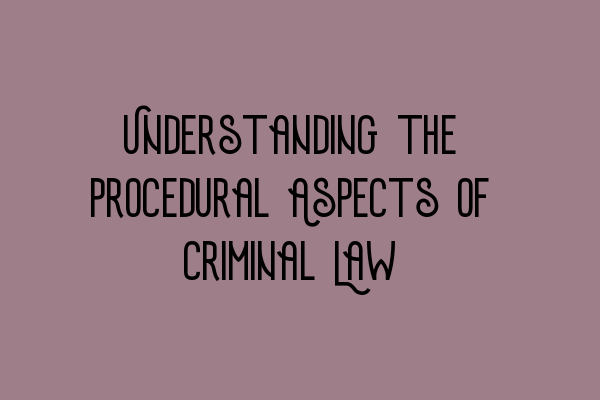Understanding the Procedural Aspects of Criminal Law
Welcome to SQE Criminal Law & Practice Law UK, where we provide comprehensive resources and expertise to help you understand and navigate the intricate world of criminal law. In this blog post, we will delve into the procedural aspects of criminal law, shedding light on the key steps and processes involved in a criminal case. Whether you are a law student preparing for the SQE exams or a legal professional seeking to enhance your knowledge, this article will provide you with valuable insights that can assist you in your journey.
The Criminal Procedure: An Overview
When a crime is committed, it triggers a sequence of procedural steps aimed at ensuring a fair and just legal process. Familiarizing yourself with the procedural aspects of criminal law is essential to comprehend the nuances and intricacies of the criminal justice system.
The criminal procedure typically consists of the following key stages:
- Investigation
- Arrest
- Charging
- Bail
- Plea
- Discovery
- Pre-trial motions
- Trial
- Sentencing
- Appeals
Each of these stages plays a crucial role in the overall process, and understanding them is fundamental for any aspiring criminal lawyer or legal practitioner.
Delving into the Key Procedural Aspects
Let us now explore the procedural aspects of criminal law in more depth:
Investigation:
Before any criminal charges can be filed, a thorough investigation is conducted to gather evidence, identify potential suspects, and determine whether a crime has been committed. The investigation stage sets the groundwork for the subsequent steps in the criminal procedure. To learn more about the investigative process, refer to our SQE 1 Preparation Courses.
Arrest:
If the investigation leads to sufficient evidence suggesting the involvement of a particular individual in the crime, an arrest may be made. Understanding the rules and procedures governing arrests is vital for both defendants and legal professionals. For additional information, check out our article on SQE 2 Preparation Courses.
Charging:
Once a suspect is arrested, the prosecuting authorities evaluate the evidence and decide whether to formally charge the individual with a crime. This stage involves assessing the strength of the evidence and determining the appropriate charges. To familiarize yourself with the intricacies of charging in criminal law, refer to our article on SQE 1 Practice Exam Questions.
Bail:
After being charged, the defendant may be granted bail, allowing them to be released from custody while awaiting trial. Understanding the factors that influence a bail decision is crucial for criminal law practitioners. To gain further insights, explore our resources on SRA SQE Exam Dates.
Plea:
During the plea stage, the defendant has the opportunity to enter a plea of guilty, not guilty, or no contest. The plea choice significantly impacts the subsequent course of the criminal case. To enhance your understanding of plea bargaining and related topics, we recommend our article on SQE 1 Practice Mocks FLK1 FLK2.
Discovery:
The discovery stage involves the exchange of information between the prosecution and defense. It allows both parties to assess the strength of the opposing case and prepare their strategies accordingly. Familiarize yourself with the rules and approaches to discovery by referring to our comprehensive guide on SRA SQE Exam Dates.
Pre-trial motions:
Prior to the trial, various pre-trial motions may be filed by the defense or prosecution to address legal issues, evidence admissibility, or other procedural matters. Understanding the ins and outs of pre-trial motions is crucial for criminal law practitioners aiming to build a strong case. To gain expertise in this area, explore our resources on SQE 2 Preparation Courses.
Trial:
The trial is the centerpiece of the criminal procedure, where the prosecution presents evidence and witnesses to prove the defendant’s guilt beyond a reasonable doubt. The defense has the opportunity to challenge the evidence and present a counterargument. Understanding trial procedures and courtroom dynamics is essential for any criminal law practitioner. For further guidance, refer to our article on SQE 1 Practice Exam Questions.
Sentencing:
If the defendant is found guilty, the court proceeds to the sentencing stage. Sentencing can vary widely depending on the nature of the crime and other relevant factors. Understanding the principles of criminal sentencing is crucial for legal professionals involved in the criminal justice system. Explore our resources on SQE 1 Practice Mocks FLK1 FLK2 for additional insights.
Appeals:
If a party believes that a legal error occurred during the trial or sentencing, they may have the right to appeal the decision. Understanding the grounds and processes for appeal is imperative for criminal law practitioners engaged in post-conviction work. For a comprehensive understanding, refer to our article on SQE 1 Preparation Courses.
Conclusion
Criminal law involves intricate procedural aspects that play a critical role in ensuring a fair and just legal system. Understanding these procedural steps is vital for law students preparing for the SQE exams and professionals seeking to deepen their knowledge in criminal law. By delving into the investigation, arrest, charging, bail, plea, discovery, pre-trial motions, trial, sentencing, and appeal stages, you will develop a comprehensive understanding of the criminal procedure. For further resources and preparation materials, visit our website at SQE Criminal Law & Practice Law UK.
